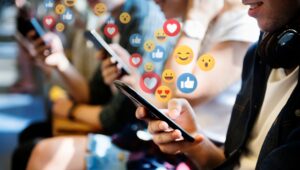The Impact of Social Media on Teenagers’ Mental Health
Introduction
In today’s digital age, social media has seamlessly integrated into the daily lives of teenagers. While it brings undeniable benefits like connectivity and information sharing, excessive use can negatively impact adolescents’ mental well-being. This article delves into the mental health implications of social media among teenagers.
Understanding Social Media:
Teenagers use platforms like Instagram, Snapchat, and TikTok to interact, exchange stories, and display their creativity. But these platforms’ selective material and artificial standards can foster low self-esteem and feelings of inadequacy. Teens may find themselves comparing their life to those shown online as they scroll through carefully chosen photos and stories, which can cause them to feel unsatisfied and insecure. Furthermore, a constant desire for reinforcement through likes and comments can intensify feelings of insecurity and drive a constant desire for conformity to cultural values that are propagated by peers and influencers. The constant exposure of teens to romanticized interpretations of reality has the potential to significantly affect their mental health and warp their perspectives.
Adverse Impacts of Social Media on Mental Well-Being:
•Comparison and Envy: Due to social media’s widespread use, teens may get a peek into their friends’ life, which frequently only presents the highlights and triumphs. As a result of this ongoing exposure, people may develop an incorrect understanding of reality in which they contrast their real-life events and pictures with those that have been deliberately selected and posted online, which can lead to emotions of jealousy and inadequacy. This may fuel a sense of discontent with one’s own life.
•Cyberbullying: The private nature that the internet affords fosters an atmosphere in which people feel empowered to act hurtfully without fear of repercussions. Cyberbullying, whether it takes the form of private messages, open remarks, or forums with anonymous users, can seriously harm teens’ mental health. Victims may feel alone, ashamed, or anxious, which can lower their self-esteem and negatively affect their general wellbeing.
•Sleep Disturbances: Teenagers who use social media frequently stay up late, browsing through their feeds and interacting with others online. The body’s normal sleep-wake cycle may be disturbed by this prolonged screen time before bed, making it harder to fall asleep and remain asleep. Teens may thus suffer from daily exhaustion, impatience, and trouble focusing in class, which may eventually have an impact on their scholastic achievement and general quality of life.
•Fear of Missing Out FOMO: Users of social media platforms are bombarded with notifications and updates all the time, which makes them feel as though they must always be connected and aware. Teenagers who browse through their feeds are constantly exposed to the experiences and activities of others, which can cause them to become fearful of missing out on interesting chances or events. Teens who experience this overpowering worry may obsessively check their social media accounts to try to keep current, even at the risk of their mental health.
•Bad Body Image: Adolescents’ opinions of their own bodies may be distorted by the abundance of filtered photos and exaggerated beauty standards on social media sites. Feelings of inadequacy and discontent with one’s appearance might arise from constant exposure to photos of flawless features and finely shaped bodies. Teenagers who are striving to meet an impossible standard of beauty may express their discontent through hazardous habits like intense dieting, excessive exercise, or even the emergence of eating disorders.
Effective Coping Techniques:
•Setting boundaries: Teens may take charge of their online behaviors and give priority to activities that support their mental health by being encouraged to set clear boundaries around their use of social media. Teens may establish boundaries for tech-free zones and screen time limitations, which will free up time for important offline activities.
•Encouraging Offline Activities: Teens may benefit greatly from this much-needed break from the demands of social media if they are encouraged to participate in offline hobbies and social activities. Engaging in offline activities, such as sports, arts and crafts, or volunteer work, enables youngsters to foster interests, form significant relationships, and expand their sense of self outside the virtual world.
•Encouraging Digital Literacy: Teaching teens to think critically and to be aware of the possible risks associated with social media can enable them to use the internet responsibly. Teenagers can make better judgments and fend off bad influences if they are taught how to assess the reliability of internet sources, spot deception techniques, and safeguard their privacy online.
•Promoting Open Communication: One of the most important ways to lessen the negative impacts of social media on teens is to provide a safe space where they feel comfortable talking about their experiences on the internet and asking for assistance when they need it. Teenagers may build resilience and coping mechanisms to deal with the difficulties of the digital world by being supported and guided, having an honest conversation about the demands of social media, and having their feelings acknowledged.
Conclusion
Even if social media has many advantages, it is impossible to overlook how it affects teens’ mental health. Social media has several detrimental consequences on teenagers’ wellbeing, ranging from comparison and jealousy to cyberbullying and affirmation seeking. However, parents, educators, and legislators can help teenagers navigate the digital landscape more skillfully and support their overall mental health and well-being by understanding these challenges and putting positive coping strategies into practice, such as setting boundaries, encouraging offline activities, promoting digital literacy, and fostering open communication.



























